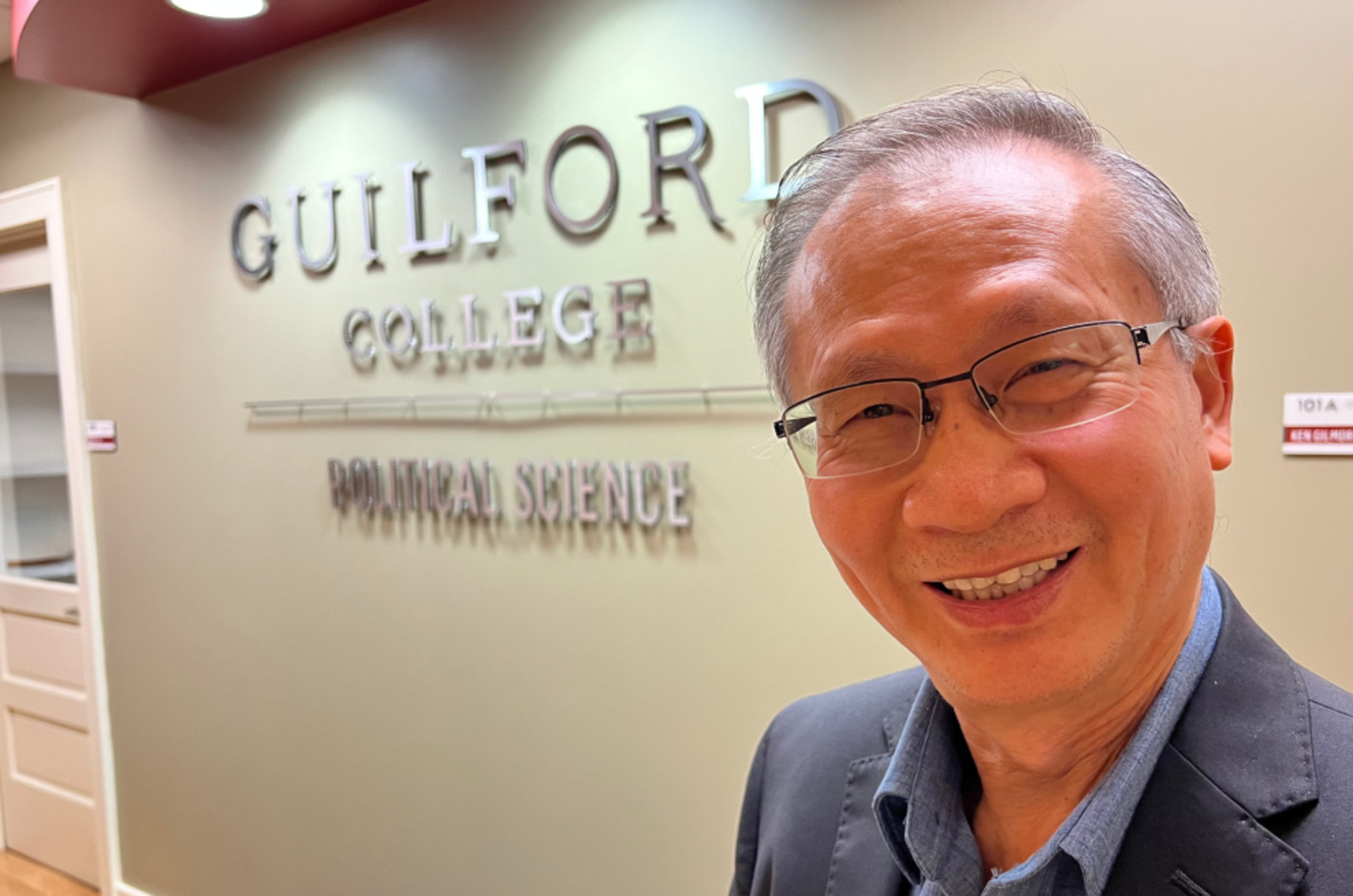
As China flexes its economic and political power across the globe, Political Science Professor George Guo is the one experts rely on to make sense of it all.
“I love teaching at Guilford. There’s so much freedom and flexibility at a college this size. Bigger universities have everything set up and there’s no room to change, but Guilford gives us freedom to teach what we think is appropriate.”
It was 1989 and the Chinese Communist Party had big plans for Xuezhi Guo, plans he was eager to be a part of, too. Xuezhi had already earned a degree in Engineering in China, and was pursuing his master’s and doctoral work in West Germany on a fellows scholarship before returning home for a plum position with the country’s Ministry of Transport designing ships.
Life, of course, had other plans. Like most of the world that spring, Xuezhi was captivated as pro-democracy students and residents protested in Tiananmen Square, Beijing’s massive city square. After seven weeks and no movement from either side, Chinese soldiers put a bloody end to the protests, opening fire and killing thousands.
Thirty-three years later, the images from that day are no less crisp for residing on the distant edge of Xuezhi’s memory. “Senseless, so senseless,” he says. “(The government) didn’t have to do what they did. There was no excuse for it.”
Within days of the massacre, Xuezhi made the decision. “I couldn’t go back after that,” he says. “Not after what they did. How could I?”
These days, Xuezhi has a different home and a different job. He even answers to a different name. “It’s a life I never expected until that day, but it’s a life I’ve loved if that makes sense,” says George Guo, Guilford’s Lincoln Financial Professor of Political Science.
Shortly after the massacre, George was granted political asylum in West Germany. He later applied for and received permission to complete his master's and doctorate in Public Administration at the University of Virginia. One day after class, Xuezhi asked a professor why he was never called upon to answer questions.
The professor unblushingly told Xuezhi it was because he didn’t know how to pronounce his given name. The two came to an agreement. Xuezhi would henceforth be known as George. “From then on I answered a lot of questions," he says, laughing.
These days George is on the receiving end of those questions — and not just from students. National and international media seek out George for his insights into China’s changing economy, its leaders and culture. He’s written three books on the country — from traditional Chinese political theory to the role of the Communist Party’s core leader Xi Jinping.
No issue looms as large as China’s growing economy. The country is expected to overtake the United States to become the world’s biggest economy in 2028, according to the Centre for Economics and Business Research.
Historically, he says, global powers in economic decline yield their influence without conflict. He points to Great Britain as an example of a country that did not resist America’s growing economy which eventually surpassed Great Britain in the early 1920s.
This time, says George, America is not yielding quietly. As China’s influence grows, the conflict and tension between the countries (like February's Chinese surveillance balloon incident) is only escalating.
Growing up in China George would have never imagined teaching at Guilford. When George reached high school he and thousands of other villagers were forcibly herded to communes in China's countryside to work hours of manual labor and be re-educated as part of the Cultural Revolution in the 1970s.
There, millions of citizens — intellectuals to housewives, workers to peasants — attended classes where Communist ideology was always taught.
“Mobilization,” as George puts it, was carried out on a scale never before seen. The extent of Chinese Communist propaganda was so unprecedented that the Western world coined a different term for it: “brainwashing.”
When he wasn’t consumed with manual labor and Communist ideology, George was a 17-year-old high school teacher in his commune. “I was very good in math and the other subjects, but I didn’t want that for me. I could see early that it was going to be a hard life.”
George took a national test for college, finishing second in his region. That was his ticket to college, to West Germany. And while life didn’t turn out quite the way the Communist Party intended for George, he has no regrets.
“I love teaching at Guilford,” he says. “There’s so much freedom and flexibility at a college this size. Bigger universities have everything set up and there’s no room to change, but Guilford gives us freedom to teach what we think is appropriate.”
That freedom can be seen in the courses George has taught over 22 years. At a larger university, George says he might be allowed to teach five or six classes. At Guilford, George has taught more than two dozen classes shaped by the times and headlines.
Like any discipline, George says Political Science has evolved over the past century. That evolution accelerated following Sept. 11, 2001.
“Most of social science has been influenced by the Western-centered, European-centered idea on theories and approaches,” says George. “But after September 11 the huge change has been that Americans should understand different customs. Now we realize we need to understand more about other cultures. We’re trying to understand their cultures, their philosophies and ideas. That’s a huge change (of thinking) from not so long ago.”
That new lens for viewing and teaching Political Science is on display in all of George’s classes. “That’s the freedom we need to grow our students. Guilford gives us that freedom.”

